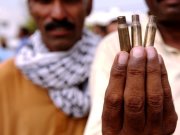
Nothing has improved in Balochistan, where murders of dissidents and minority persecution are on the rise. NEFER SEHGAL/FILE
|
 Balochistan: The province where human rights are bullet-riddled
Balochistan: The province where human rights are bullet-riddled
By Shehzad Baloch / Sohail Khattak
QUETTA/KARACHI:
Saturday was International Human Rights Day, though in Pakistan the focus remained squarely within its own borders and on one province in particular.
The Human Rights Commission of Pakistan observed the day in solidarity with the people of Balochistan. Taking a look at recent statistics and hearing the stories from some of those affected, one understands why.
According to an HRCP report, as many as 225 bullet-riddled bodies of missing persons were found between July 2010 and November 2011. The Voice for Baloch Missing Persons (VFBMP) puts the toll even higher, at 236, and says that all the victims had direct or indirect political affiliation with Baloch nationalist parties or student organisations.
Most worryingly, the numbers are getting worse. 107 new cases of missing persons have been reported this year, out of which 97 people have been found dead in different locations in the province.
“The writ of the government does not exist in Balochistan” says Tahir Hussain, chairman of the HRCP Balochistan chapter.
Hussain also pinpoints the fragile existence of minority communities in the province. “Minorities are compelled to migrate from Balochistan as they have become a soft target for kidnapping for ransom. At least 100 families belonging to the Hindu community have migrated from Balochistan solely because of kidnapping for ransom,” he says. In addition, as many as 80 Shias were killed in targeted killing and bomb blasts this year.
Settlers are also at risk. “Over 100 families, who are Punjabi and Urdu-speaking, have left the province because they were vulnerable to targeted killing by separatist groups,” he said.
Even those defending such minorities and standing up for human rights are under threat. Two activists – Naeem Sabir and Mohammad Siddiq Edo – were kidnapped and their bodies turned up this year,” the HRCP report states.
Mir Asghar Bangulzai, the uncle of VFBMP chairman Nasurllah Baloch, was kidnapped in June 2000 by a group of armed men from Quetta and released after a few days. However, Bangulzai, a tailor by profession, was again abducted in October 2001. A decade has passed and the family is still in the dark regarding his whereabouts. They blame the security forces for the kidnapping.
“You cannot imagine the kind of pain a family goes through when their loved one has gone missing, and at the same time mutilated bodies surface almost every week,” says Nasurllah Baloch.
The HRCP report says that practices of enforced disappearance started during the Musharraf regime in early 2000 and have steadily intensified. “The situation has gone from bad to worse with the discovery of mutilated bodies. Ironically there is no investigation in any of the cases,” says Tahir Hussain.
It adds that security forces are involved in practices of enforced disappearances, while some Baloch armed groups are behind the targeted killing of innocent settlers.
HRCP Balochistan urged the government to investigate the involvement of politicians and security forces. HRCP also demanded that a judicial inquiry be launched into the kidnapping and dumping the bodies of political opponents. Security forces, however, categorically reject the allegations of foul-play in the province
HRCP highlights Balochistan
Addressing the media at Karachi’s press club on Saturday, HRCP Chairperson Zohra Yusuf appealed to the government to address the sense of alienation felt by the people of Balochistan.
Saying the issue was “of foremost concern in the country today,” Yusuf commemorated the day by saying that people in Balochistan “believe that the government of Pakistan is doing injustice with them and such sentiments are increasing.”
However, relatives of Baloch missing persons announced that they would not take part in the rally organised by HRCP Balochistan to observe the human rights day. “The HRCP does not have any role to play for the safe recovery of missing persons,” said Nasurllah Baloch. “The organization has prioritised other issues, giving lesser attention to the gross violation of human rights. We are holding a separate rally to highlight our plight.”
At the conference, the chairperson repeatedly crticised the government for their role in the violation of Balochistan’s human rights.
Published in The Express Tribune, December 11th, 2011.
(2011-12-11/tribune.com.pk)
|





